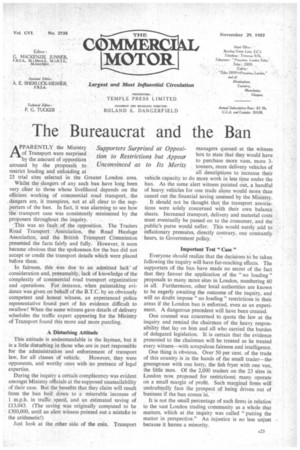The Bureaucrat and the Ban
Page 25

If you've noticed an error in this article please click here to report it so we can fix it.
ApPARENTLY the Ministry of Transport were surprised by the amount of opposition aroused by the proposals to restrict loading and unloading at 23 trial sites selected in the Greater London area.
Whilst the dangers of any such ban have long been very, clear to those whose livelihood depends on the efficient working of commercial road transport, the dangers are, it transpires, not at all clear to the supporters of the ban. In fact, it was alarming to see how the transport case was consistently minimized by the proposers throughout the inquiry.
This was no fault of the opposition. The Traders Road Transport Association, the Road Haulage Association, and the British Transport Commission presented the facts fairly and fully. However, it soon became obvious that the spokesmen for the ban did not accept or credit the transport details which were placed before them.
In fairness, this was due to an admitted lack of consideration and, presumably, lack of knowledge of the complexity of commercial road transport organization' and operations. For instance, when painstaking evidence was given on behalf of the B.T.C. by an obviously competent and honest witness, an experienced police representative found part of his evidence difficult to swallow! When the same witness gave details of delivery schedules the traffic expert appearing for the Ministry of Transport found this more and more puzzling.
A Disturbing Attitude This attitude is understandable in the layman, but it is a little disturbing in those who are in part responsible for the administration and enforcement of transport law, for all classes of vehicle. However, they were opponents, and worthy ones with no pretence of legal expertise.
During the inquiry a certain complacency was evident amongst Ministry officials at the supposed unassailability of their case. But the benefits that they claim will result from the ban boil down to a miserable increase of I m.p.h. in traffic speed, and an estimated saving of £13,043. (The saving was originally computed to be £300,000, until an alert witness pointed out a mistake in the arithmetic!) Just look at the other side of the coin. Transport managers queued at the witness box to state that they would have to purchase more vans, more 3twitters, more delivery vehicles of all descriptions to increase their vehicle capacity to do more work in less time under the ban. As the same alert witness pointed out, a handful of heavy vehicles for one trade alone would more than cancel out the financial saving assessed by the Ministry.
It should not be thought that the transport associations were solely concerned with their own balance sheets. Increased transport, delivery and material costs must eventually be passed on to the consumer, and the public's purse would suffer. This would surely add to inflationary pressures, directly contrary, one constantly hears, to Government policy. '
Important Test " Case " Everyone should realize that the decisions to be taken following the inquiry will have far-reaching effects. The supporters of the ban have made no secret of the fact that they favour the application of the "no loading" proposals to many more sites in London, numbering 60 in all. Furthermore, other local authorities are known to be eagerly awaiting the outcome of the inquiry, and will no doubt impose " no loading" restrictions in their areas if the London ban is enforced, even as an experiment.. A dangerous precedent will have been created.
One counsel was concerned to quote the law at the inquiry and remind the chairman of the heavy responsibility that lay on him and all who carried the burden of delegated legislation. It is certain that the evidence presented to the chairman will be treated as he treated every witness—with scrupulous fairness and intelligence.
One thing is obvious. Over 50 per cent. of the trade of this country is in the hands of the small trader—the greengrocer with one lorry, the fish fryer with one van, the little men. Of the 2,000 traders on the 23 sites in London now proposed for restrictions; many operate on a small margin of profit. Such marginal firms will undoubtedly face the prospect of being driven out of business if the ban comes in.
It is not the small percentage of such firms in relation to the vast London trading community as a whole that matters, which at the inquiry was called "putting the matter in perspective." An injustice is no less unjust because it harms a minority.




























































































